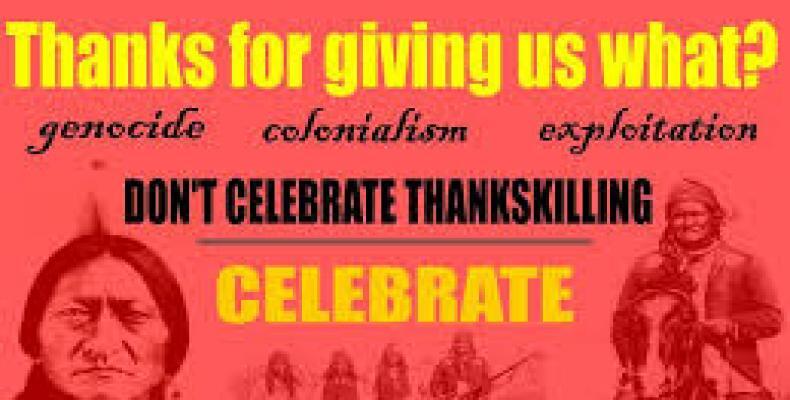Boston, November 23 (RHC)-- Thursday was Thanksgiving in the United States, which for many Americans, is a day to celebrate with food, family, and friends. But for many Native Americans, many of whom think of the day in terms of sadness and remembrance, the controversial holiday is marked with as the “National Day of Mourning.”
Since 1970, the fourth day of every November has been commemorated with a march and rally by Native Americans in Plymouth, Massachusetts, who do not celebrate the “first” Thanksgiving feast between the Pilgrims and the Indians, but instead remember the Native Americans who have lost their lives and culture since colonization.
The National Day of Mourning is a rally organized by the United American Indians of New England (UAINE) to honor Native American ancestors lost in the 1637 genocide, when hundreds of Pequot Indians were massacred, and “the struggles of Natives people to survive today.”
Each year, several hundred Native Americans living near the location of what is commonly considered the first Thanksgiving in Plymouth, Massachusetts, gather to rally and march at Cole’s Hill near Plymouth Rock.
For many participants, the tradition begins the day before at sundown with a fast, which they then break the following afternoon at a pot-luck that takes place after the march. Although the group welcomes non-Native supporters, only indigenous people are asked to speak to commemorate the struggles of the past and present.
According to the website, this year’s NDOM is “dedicated to our thousands of relatives who are migrants and are being abused by ICE and other government agencies, including having their children stolen from them.”
The annual tradition is held not only in memory of their ancestors, but as way to fight and protest existing racist beliefs and ideologies in America against all indigenous people.
In addition to protesting Thanksgiving and the “pilgrim mythology perpetuated in Plymouth,” the organization also protests racist team names and mascots, and other struggles faced by minorities in America.
“We believe very strongly that we must support others in struggle, particularly other communities of color, the LGBT community, and the disabled community,” the website states.
Indigenous communities in U.S. commemorate “Thanksgiving” as “National Day of Mourning”

Matérias relacionadas
Comentários
Deixe um comentário
Todos os campos são requeridosMais vistas
- Nicolás Maduro recorda golpe militar contra Hugo Chávez em 2002
- Sensacional sucesso cubano no Mundial Pro Tour de Vôlei de Praia
- 11ª Convenção Internacional de Ciências da Terra conclui em Cuba
- Trabalhadores cubanos se preparam para o Primeiro de Maio
- Ouro e prata para Cuba no Aberto de Natação da República Dominicana

